Rainbow Reef Unified Team
Dive Safety Through Quality Education
ESSENTIALS
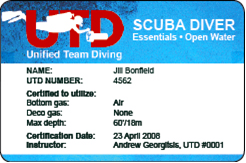
Introduction
Become a “Thinking Diver.”
The Essentials of Recreational Diving course is the point of entry for all certified divers and is the certified divers’ prerequisite for all other recreational UTD classes (except Rec 1).
Essentials is designed to cultivate the essential techniques required by all sound diving practices, irrespective of level or environment. Essentials of Recreational Diving acts as a bridge between conventional training and UTD’s more demanding curriculum.
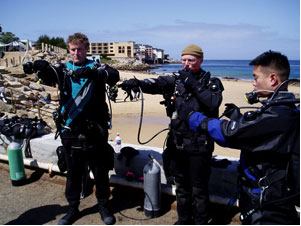
The course brings any certified diver the skills and understanding required of the more advanced UTD courses, focusing on precise buoyancy control, dive planning, ascent procedures, safety, and environmental awareness.
Prerequisites
- Minimum 16 years of age.
- Must be a certified open water diver from a recognized training agency.
Course limits
- Maximum depth is 60’/18m
- Standard gas is Air (21% O2)
- No stage decompression
- No overhead environments
Who this class is designed for?
The Essentials of Recreational Diving is where students receive the foundation of UTD philosophy, configuration and in-water skills. The class is designed for any diver that wants to learn about the benefits of UTD and apply it to their diving. The class is geared toward the newly certified open water diver, but even seasoned veteran divers have found that by incorporating UTD principles into their diving practices, they increase both safety and fun. Photographers and videographers will especially appreciate the detailed training in propulsion & precision buoyancy control that assists you in getting that perfect shot! Instructors will appreciate the "fresh look" at diver training and skill development. This is a great first step towards learning and understanding the Unified Team Diving approach.
Why Should I Take this Class?
Regardless of your experience level, UTD philosophy allows you to grow as a diver. Some divers are eager to begin incorporating the increased skill and academic demands of UTD but do not have the desire to become deep technical divers. This class is tailor made for a new open water diver who wants to know what skills they need to work on, or for the diver new to UTD who wants to learn more without the burden of passing a class. This class serves as an excellent introduction to UTD, and is perfect for someone who wants to start Recreational training in more advanced UTD classes.
Essentials Class Information
The Essentials of Recreational Diving class is designed to be taught over a two and half (2.5) day period with 4 dives.
Day 1. Typically the class begins with a 3 - 4 hour initial session consisting of introductions, a power point presentation including video tape of the skills to be introduced in the class.
Day 2. Begins with hands-on equipment fitting, review of gear configuration and a discussion of the pros and cons of various equipment choices. Once the gear in properly fit and configured the class then focuses on the “dry runs” of the skills and some practice before entering the water. Dry runs allow the student to practice the skills on land under the watchful eye of the instructor(s). Skills include improving diver trim, proficiency in precision buoyancy control, perfecting propulsion techniques (including learning how to kick backwards), fine-tuning equipment configurations, refining underwater communication, utilizing a team diving approach, and effective dive planning. Students will then conduct two (2) dives putting the skills and concepts learned in the morning session into actual practice while the videographer captures the in-water session for review after lunch. We conclude the day with a 1-2 hour video review.
Day 3. The third day will commence with practicing additional skills and improving on the prior days performance, during two (2) more dives which will again be videotaped for subsequent review. After lunch the class will conclude with the video review, final lecture session and student performance review.
All UTD classes are videotaped for educational and review purposes only. We believe it is invaluable for students to visually focus on their individual in-water skills, situational awareness, communication, and team diving. Learning to self evaluate is an important aspect of the class. You will be evaluated during the class to obtain the UTD "Essentials of Recreational Diving" Certification. This Certification will allow you to continue within the UTD Recreational Training curriculum. Our focus is the complete dedication to your diving skills, knowledge & in water practice.
Requirements
- Minimum age of 18
- Completed UTD registration process
- Complete the Essentials Online Knowledge Base Class
- Open water certification
- All UTD classes are Non Smoking
- The use of prescription drugs must be authorized prior to the onset of diver training by a physician
- Must be able to swim a distance of at least 50 feet/15 meters on a breath hold.
- Must be able to swim at least 300 yards/275 meters in less than 14 minutes without stopping.
Getting Started
- Check the schedule of classes in your area
- Register Online
- Complete the online Knowledge Base course for Essentials of recreational Diving
- Get a copy and review the "Essentials of Recreational Diving DVD"
Guidelines
- Average depth during class of 20ft (6m) - 30ft (9m).
- Air or Nitrox
- Single tank configuration
- Long hose primary, and necklace style backup regulator hose configuration
- Instructor to student ratio maximum 6:1 in open water, adjusting downward for environmental conditions.
Equipment Specifications
UTD equipment configuration is designed to be simple, efficient, and consistent. To get the most from your class it is advisable that you take the course in a complete UTD style system. You do not have to own any UTD equipment. You can rent you all the equipment (even the back plate and wing if necessary.) To better assist you in preparing for class, we have listed below our required and suggested equipment lists for the class.
Required Equipment:
- 5 or 7 ft. Primary Regulator Hose. Without this you will not be able to learn and conduct air sharing correctly.
- Fins: non-split variety. Without these you will be unable to learn proficient fin kick.
* Note all equipment can be rented for the course .
Recommended Equipment:
- Back plate BC System, SS or Aluminum Back plate w/ web harness and hardware
- Back inflate style wing
- At least one depth-measuring device
- At least one time-keeping device
- At least one cutting device
- X-notes or Wetnotes
- One spool with 100 feet of line
- One surface marker or lift bag
- Exposure suit appropriate for the environment you will be diving in.
Suggested Accessories (not required, just nice if available for you):
- BC mounted canister dive light w/ Goodman handle or long hose catch such as a knife pouch.
Cylinders: Single tank configuration with K, H, or Y valve (need 2 per day of diving)
- Double tank configuration (1 per day of diving)
- No stage or decompression bottle is necessary for this class.
REC 1 DIVER
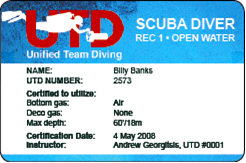
REC 1 Introduction
The Recreational Diver 1 course is the first in a series of recreational, or entry level classes, designed to teach NON-certified divers the wonders of diving. UTD’s Rec 1 class builds a solid diving platform using the law of primacy as the greatest teaching tool.
This class is structured to prepare divers for recreational diving using proper equipment, diving techniques and breathing mixtures. The class combines basic scuba diving theory with knowledge and the UTD equipment configuration, allowing each student to see the big picture while they learn to think in the water.
Recreational 1 Diver training focuses on introducing brand new divers to the in-water skills similar to that of Essentials or Intro to Tech. This will include problem identification and resolution, which builds the basis for the beginning diver to practice, and then continuing on to progressively more challenging diving. In this class, students will be trained in the use of single tanks/cylinders and in the potential failure problems associated with them.
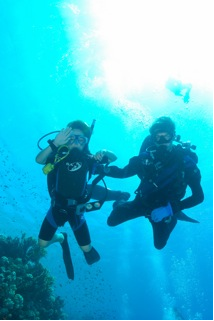
UTD’s Rec 1 focuses on the fun of underwater exploration while teaching good diving skills, safety, and a tremendous respect for the marine environment.
Prerequisites
- Minimum 16 years of age
Course limits
- Maximum depth 60’/18m
- Standard gas is Air (21% O2)
Who this class is designed for?
The Recreational 1 class is presented in a friendly learning environment where new divers will learn from the start the foundation of UTD configuration and UTD philosophy similar to that learned in the "Essentials of Recreational Diving". The class is designed for the recreational diver who wants to learn proper recreational diving from the start. In other words those who want to become a recreational diver (single tank, no decompression diving) yet want to become a safe and well rounded recreational diver with a great platform to build the rest of their diving career upon and applying the UTD principles into their recreational diving practices to increase both safety and fun.
Why Should I Take this Class?
The Recreational 1 class focuses on the foundational building block and skills of UTD configuration and is limited to 60'/18m. Many beginning recreational divers now want to start their diving career with a solid foundation and want to ensure when they learn the next set of skills or equipment or theory that thing will not change. They want to stay consistent to the ideologies and ultimately safely explorer this new territory up to 60'/18m while still using Air and single tanks.
Class Information
The UTD Recreational 1 course is normally conducted over a 5-6 day period, and cumulatively involves a minimum of 50 hours of instruction designed to provide a introduction to UTD equipment configuration, basic scuba diving physics and physiology, Minimum decompression, including history of decompression and practice, physics, physiology, tables, and operational considerations including situational awareness and understanding scuba environment. The inwater skills will first conducted in a confined water environment prior to entering the openwater. These skills will include but not limited to snorkeling techniques, buoyancy, trim, propulsion and basic 6 air sharing and valve management.
Course requirements include ten (10) hours of academics and six (6) hours of confined water work, eight (8) dives, four (2) of which will be critical skill dives and two (2) will be experience dives as defined in the UTD standards and procedures.
The initial two (2) dives will be conducted in water no deeper then 30 feet (15 meters) to evaluate the diver’s ability and to transition from the Pool to the Openwater environment while still maintaining the required skill levels. The last two dives are to be at depth for experience, but not in excess of course depth limitations.
All UTD classes are videotaped for educational and review purposes only as we believe this is invaluable for students to visually focus on their individual in-water skills, situational awareness, communication, and team diving. Learning to self evaluate is an important aspect of the class. You will be evaluated during the class to obtain the UTD "Recreational 1" Certification. This Certification will allow you to Scuba Dive unassisted by an Instructor or Dive Master within your certification limitations and to continue within the UTD Recreational Training curriculum. Our focus is the complete dedication to your diving skills, knowledge & in water practice. In our helpful hints section and our Learning Center you can find out more information about the class, the equipment and skills you will be learning about.
Requirements
- Minimum age of 16
- Completed UTD registration process
- All UTD classes are Non Smoking.
- The use of prescription drugs must be authorized prior to the onset of diver training by a physician
- Must be able to swim a distance of at least 50 feet/15 meters on a breath hold.
- Must be able to swim at least 300 yards/275 meters in less than 14 minutes without stopping.
Getting Started
- Check the Schedule of classes in your area
- Register Online
- Complete the Online Knowledge Base course for Recreational 1
- Get a copy of and review the "Essentials of Recreational Diving DVD"
Guidelines
- Single configuration
- Long hose primary, and necklace style backup regulator hose configuration
- Student to Instructor ratio is not to exceed 6:1 during land drill or surface exercises but 3:1 during any direct in-water training.
- Maximum training depth 60 feet (18m) (+/- 20 feet (+/- 6 meters)).
- No overhead environment diving
Equipment Requirements
Each student should have, and be familiar with, all of the following required equipment.
- Tanks/Cylinders:
- Single. All dives must start with a minimum of 72ft3/1850 liters.
- Appropriate Regulators system
- Buoyancy Compensator:
- Harness system
- At least one depth-measuring device.
- Compass.
- A timekeeping devices.
- Minimum and No-Decompression tables.
- Mask and fins
- Minimum of one cutting device.
- Exposure suit appropriate for the duration of exposure
REC 2 DIVER
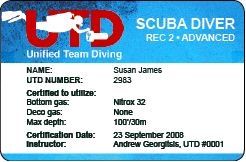
REC 2 Introduction
The Recreational Diver 2 course is the next step for divers wishing to expand their llimits to slightly deeper depths without venturing into decompression. The class is structured to prepare divers for a wider range of environment conditions, deeper environments, and more advanced recreational diving using proper equipment, diving techniques and breathing mixtures.
Rec 2 introduces thorough training in the use of Nitrox and certifies divers for its use. The class also incorporates teaching more advanced decompression theories and the use of lift bags and Surface Marker Buoys for correct and safe accent procedures.
Recreational Diver 2 training expands on either the Recreational Diver 1 or the Essentials of Recreational Diving and is designed to cultivate and integrate some critical skill training while solidifying the essential skills, all required for safe deeper recreational diving. Critical skills include problem identification and resolution, precise buoyancy control, ascent procedures. Rec 2 builds the capacity for progressively more challenging diving and is the next step in becoming a “Thinking Diver."
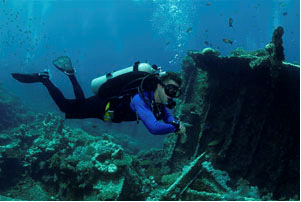
Prerequisites
- Minimum 18 years of age
- UTD Recreational 1, Essentials of Recreational Diving, Intro to Tech, or equivalent
- Minimum of 25 dives beyond open water qualification, 10 of which to be non-training dives
Course limits
- Maximum depth 100’/30m
- Standard gas is Nitrox 32
- No stage decompression
- No overhead environments
Why Should I Take this Class?
As the Recreational 1 and "Essentials of Recreational Diving" only focus on the foundational building block and skills of DIR/Hogarthian and limit you to 60'/18m. Many recreational divers now want to start extending their range beyond 60'/18m and want to ensure they learn the next set of skills to safely explorer this territory up to 100'/30m while still using Nitrox and single tanks.
Class Information
The Recreational 2 class is designed to be taught over a three (3) day period with 6 dives.
Day 1. Typically the class begins with a 3 - 4 hour initial session consisting of introductions, a power point presentation including video tape of the skills to be introduced in throughout the class. The “dry runs” of the skills and some practice before entering the water. Dry runs allow the student to practice the skills on land, before entering the water, under the watchful eye of the instructor(s). Skills reviewed are diver trim, proficiency and precision buoyancy control, perfecting propulsion techniques (including backwards kick), underwater communication, utilizing a team diving approach, Valve Drills, S-Drill, Ascent Drill, SMB deploy, rescue diver techniques as well as effective dive planning. Students will then conduct 2 (two) dives with a max depth of 40'/12m putting the skills and concepts learned in the morning session into actual practice while the videographer captures the in-water session for review. We conclude the day with a 1-2 hour video review.
Day 2. Begins with dry runs allowing the student to practice the skills on land, before entering the water, under the watchful eye of the instructor(s). Skills include simulated SMB failures, OOA emergencies, Simulated valve failures, Team separation, Mid -water ascents, Ascent line use and separation, minimum deco procedures. Students will then conduct 2 (two) dives with a max depth of 60'/18m while putting the skills and concepts learned in the dry-run session into actual practice while the videographer captures the in-water session for review. We conclude the day with a 1-2 hour video review followed by a 3 hour lecture covering Nitrox, Gas planning, Dive planning, Min Deco procedures, Emergency planning, contingencies to mention a few topics.
Day 3. The third day will commence with 2 dives to a max depth of 100'/30m where students will continue to practice all the skills and improving on the prior days performance. During these dives they will again be video taped for subsequent review. The class will then conclude with video review, final lecture session, test and student performance review. Upon successful completion of the Recreational Level 2 course.
All UTD classes are videotaped for educational and review purposes only as we believe this is invaluable for students to visually focus on their individual in-water skills, situational awareness, communication, and team diving. Learning to self evaluate is an important aspect of the class. You will be evaluated during the class to obtain the UTD "Recreational 2" Certification. This Certification will allow you to dive at what is known as an "Advanced" Diver in the industry and continue within the UTD Recreational Training curriculum. Our focus is the complete dedication to your diving skills, knowledge & in water practice. In our helpful hints section and our Learning Center you can find out more information about the class, the equipment and skills you will be learning about.
Requirements
- Minimum age of 18
- Completed UTD registration process
- Open water certification, Essentials of Recreational diving or Intro To Tech or Equivalent.
- All UTD Classes are Non Smoking.
- The use of prescription drugs must be authorized prior to the onset of diver training by a physician
- Must be able to swim a distance of at least 50 feet/15 meters on a breath hold.
- Must be able to swim at least 300 yards/275 meters in less than 14 minutes without stopping.
Getting Started
- Check the Schedule of classes in your area
- Register Online
- Complete the online Knowledge Base course for Recreational 2
- Get a copies of and review the "Essentials of Recreational Diving DVD" and “Intro To Tech” DVD
Guidelines
- Nitrox
- Single configuration
- Long hose primary, and necklace style backup regulator hose configuration
- Instructor to student ratio maximum 6:1 in open water, adjusting downward for environmental conditions.
Equipment Specifications
UTD equipment configuration is designed to be simple, efficient, and consistent. To get the most from your class it is advisable that you take the course in a complete UTD style system. You do not have to own any UTD style equipment. To better assist you in preparing for class, we have listed below our required and suggested equipment lists for the class. Please check out our Learning Center or consult with us if you have further questions about your equipment needs
Required Equipment :
- 5 or 7 ft. Primary Regulator Hose without this you will not be able to learn and conduct air sharing correctly.
- Fins: non-split variety without these you will be unable to learn proficient fin kick
- Dive light for team communication Back plate BC System SS or Aluminum Back plate w/ web harness and hardware
- Back inflate style wing.
- At least one depth-measuring device
- At least one time-keeping device
- At least one cutting device
- X-notes or Wetnotes
- One spool with 100 feet of line
- One surface marker or lift bag
- Exposure suit appropriate for the environment you will be diving in.
Suggested Accessories (not required, just nice if available for you): BC mounted canister dive light w/ Goodman handle or long hose catch such as a knife pouch.
- Cylinders Single tank configuration with K, H, or Y valve (need 2 per day of diving)
- No stage or decompression bottle is necessary for this class.
REC 3 DIVER
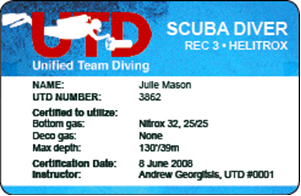
REC 3 Introduction
Recreational Diver 3 is a No-Decompression/Minimum Deco Helitrox course structured to prepare divers for deeper recreational diving using proper equipment, diving techniques and standard Helium breathing mixtures.
The class will incorporate more advanced decompression theories and the use of correct accent procedures.
Recreational Diver 3 training focuses on expanding the Essentials/Intro to Tech and the Rec 2 skills and is designed to cultivate, integrate and expand those skills required for safe deeper recreational diving. This will include problem identification and resolution and building the capacity for progressively more challenging diving.
In this class, students will be trained in, the use of single or double back gas tanks/cylinders and in the potential failure problems associated with them; the use of Nitrox and Helitrox for extended bottom times; and the use of Helium to minimize narcosis, CO2, gas density and post dive “nitrogen stress.”
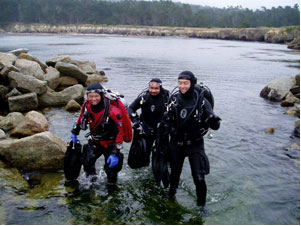
This is an NDL/min deco class preparing a diver for depths to 130’/39m without accelerated decompression procedures.
Prerequisites
- Minimum 18 years of age
- UTD Rec 2, or Intro to Tech and Nitrox, or equivalent
- Minimum of 50 dives beyond open water certification, 25 of which must be non-training dives
Course limits
- Maximum depth 130’/39m
- Standard gases are Nitrox 32 and Helitrox 25/25
- No stage decompression
- No overhead environments
Who this class is designed for?
The “Recreational Diving level 3” class is a friendly learning environment where the students will build upon their foundation of Essentials or Intro to tech and/or Recreational level 2 or equaivalent. The class is designed for the recreational diver who wants to learn the final step in recreational diving without moving into deco bottles or staged decompression, tech or overhead environments. In other words those who want to stay within recreational diving limits of 130'/39m but want to use both doubles and enriched mixtures of helium (Helitrox 25/25) and are not afraid of doing minimum amount of deco. It's geared towards those who have taken Essentials of recreational diving or Intro to Tech and/or the Recreational Level 2 and now want the next step in applying the UTD foundation and UTD principles into their deeper recreational diving practices to increase both safety and fun.
Why Should I Take this Class?
As the previous recreational classes have focused on the foundational building blocks, some experience skills, using single tanks and nitrox to a limit of 100'/30m, many recreational divers now want to start extending their range beyond 100'/18m and want to ensure they learn the next set of skills to safely explorer this territory. This class serves as an excellent next step is perfect for someone who wants to learn how to Do it Right when using doubles and helium between 100'/30m - 130'/39m without carrying deco or stage bottles and without going into staged decompression diving.
Class Information
The “Recreational level 3” class is designed to be taught over a three (3) day period with 6 dives.
Day 1. Typically the class begins with a 3 - 4 hour initial session consisting of introductions, a power point presentation including video tape of the skills to be introduced in throughout the class. The “dry runs” of the skills and some practice before entering the water. Dry runs allow the student to practice the skills on land, before entering the water, under the watchful eye of the instructor(s). Skills reviewed are diver trim, proficiency and precision buoyancy control, perfecting propulsion techniques (including backwards kick), underwater communication, utilizing a team diving approach, Valve Drills, S-Drill, Ascent Drill, SMB deploy, rescue diver techniques as well as effective dive planning. Students will then conduct 2 (two) dives with a max depth of 60'/18m putting the skills and concepts learned in the morning session into actual practice while the videographer captures the in-water session for review. We conclude the day with a 1-2 hour video review.
Day 2. Begins with dry runs allowing the student to practice the skills on land, before entering the water, under the watchful eye of the instructor(s). Skills include simulated SMB failures, OOA emergencies, Simulated valve failures, Team separation, Mid -water ascents, Ascent line use and separation, minimum deco procedures. Students will then conduct 2 (two) dives with a max depth of 100'/24m while putting the skills and concepts learned in the dry-run session into actual practice while the videographer captures the in-water session for review. We conclude the day with a 1-2 hour video review followed by a 3 hour lecture covering Nitrox, Gas planning, Dive planning, Min Deco procedures, Emergency planning, contingencies to mention a few topics.
Day 3. The third day will commence with 2 dives to a max depth of 130'/39m where students will continue to practice all the skills and improving on the prior days performance. During these dives they will again be video taped for subsequent review. The class will then conclude with video review, final lecture session, test and student performance review.
All UTD classes are videotaped for educational and review purposes only as we believe this is invaluable for students to visually focus on their individual in-water skills, situational awareness, You will be evaluated during the class to obtain the UTD "Recreational 3" Certification. This Certification will allow you to dive within the certification limitation, the use of Helium as a recreational diver and is the completion of the recreational curricula and if you want to continue will allow you to continue within the UTD Technical Training curriculum. Our focus is the complete dedication to your diving skills, knowledge & in water practice. In our helpful hints section and our Learning Center you can find out more information about the class, the equipment and skills you will be learning about.
Requirements
- Minimum age of 18
- Completed UTD registration process
- Open water certification, Essentials of recreational diving or Intro To Tech or recreational 2 or Equivalent.
- All UTD Classes are non smoking courses
- The use of prescription drugs must be authorized prior to the onset of diver training by a physician
- Must be able to swim a distance of at least 50 feet/15 meters on a breath hold.
- Must be able to swim at least 300 yards/275 meters in less than 14 minutes without stopping.
Getting Started
- Check the Schedule of classes in your area
- Register Online
- Complete the online Knowledge Base course for Recreational 3
- Get a copy and review the "Essentials of Recreational Diving DVD", Intro To Tech DVD and Technical DVD
Guidelines
- Nitrox/Helitrox
- Single or Double tank* configuration
- Long hose primary, and necklace style backup regulator hose configuration
- Instructor to student ratio maximum 6:1 in open water, adjusting downward for environmental conditions.
* Taking this class in doubles does require either the Intro to tech or Doubles Mini (or equivalent as a prerequisite).
Equipment Specifications
UTD equipment configuration is designed to be simple, efficient, and consistent. To get the most from your class it is advisable that you take the course in a complete UTD style system. You do not have to own any UTD equipment. To better assist you in preparing for class, we have listed below our required and suggested equipment lists for the class. Please check out our Learning Center or consult with us if you have further questions about your equipment needs
Required Equipment:
- 5 or 7 ft. Primary Regulator Hose without this you will not be able to learn and conduct air sharing correctly.
- Fins: non-split variety without these you will be unable to learn proficient fin kick
- Dive light for team communication Back plate BC System SS or Aluminum Back plate w/ web harness and hardware
- Back inflate style wing.
- At least one depth-measuring device
- At least one time-keeping device
- At least one cutting device.
- X-notes or Wetnotes
- One spool with 100 feet of line
- One surface marker or lift bag
- Exposure suit appropriate for the environment you will be diving in.
Suggested Accessories (not required, just nice if available for you): BC mounted canister dive light w/ Goodman handle or long hose catch such as a knife pouch.
- Cylinders Single tank configuration with K, H, or Y valve (need 2 per day of diving)
- Optional Double tank configuration* (1 per day of diving)
- No stage or decompression bottle is necessary for this class.
NITROX
This is a Nitrox class for certified divers that covers, in detail, current uses of “back-gas” breathing mixtures with an oxygen content of 32%. Breathing Nitrox allows for extended bottom times and/or a safety margin over air in depths to 100 feet/30m.
The class covers the practical and theoretical aspects of breathing high-oxygen gas mixtures, gas laws and physics, physiology, gas blending and safety, maximum operating depths, “Min-deco” procedures, and an academic introduction to decompression diving.
A large portion of the class is devoted to gas planning, creating an understanding of “Rock Bottom,” or “Min-gas,” whicih is the amount of gas required to bring two divers safely to the surface from a dive’s maximum depth.
This is a class that gives the student a practical knowledge and understanding of breathing Nitrox.
Prerequisites
- Minimum 18 years of age
- UTD Rec 1 or Open Water certification from a recognized agency
Course Limits
- Maximum depth 100’/30m
- Standard gas is Nitrox 32
- No stage decompression
- No overhead environments
RESCUE DIVER
This may be the most important class any diver may take.
UTD’s Rescue Diver course is designed to prepare the student for a variety of emergency situations and is centered around both self-rescue and buddy-rescue.
Self-rescue skills begin with accident avoidance, dive planning, comfort in the water under stressful situations, and equipment failures. Buddy-rescue skills include missing diver and search protocols, multiple air-sharing situations, lost mask/no visibility situations, assisting tired, panicked, disoriented, and unconscious divers at depth and on the surface, SMB deployment and surface communications.
The student completing this Rescue class will be more comfortable in the water and will be much more alert in preventing small situations from becoming full-fledged emergencies.
This class covers divers equipped in both UTD/DIR/Hogarthian gear and recreational gear.
Prerequisites
- Minimum 18 years of age.
- UTD Recreational 1, Essentials of Recreational Diving, or open water certification from a recognized agency
- Within the prior two years, First Aid/CPR/AED/O2 administration course from a recognized agency
- Minimum of 25 dives beyond open water certification, 10 of which must be non-training dives
Course Limits
- Maximum training depth 60 /18m
- Standard gases are Air and Nitrox 32
- No overhead environment diving
- No stage decompression
DIVEMASTER
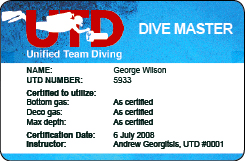
DIVEMASTER
UTD’s Divemaster course is a leadership certification program designed to train UTD divers to organize and lead diving activities and assist on UTD classes. A UTD Divemaster may work as an assistant to a UTD Instructor on any class that the Divemaster is rated for.
During the course of the UTD Divemaster training, the DM candidate will be performing skills to a demonstration level, similar to that of an instructor. It’s important to note that the goal of the Divemaster program is not to teach a DM candidate to dive, but to teach a DM candidate to teach and lead.
The core of the UTD Divemaster program is leadership. The DM Candidate will become comfortable coordinating classes and events, assisting in academic, land drills, and in-water training. In many cases, this is a diver’s first step on the road to becoming a UTD Instructor.
Prerequisites
- Minimum 21 years of age
- UTD Rec 2 or equivalent
- UTD Rescue Diver or equivalent
- Certified in First Aid/CPR/AED/O2
- Minimum of 200 dives beyond open
Course Limits
Maximum depth and gases limited by the certification level of the Divemaster candidate.
SCOOTER 1

Scooter 1
This unique Scooter 1 class is designed to share the essential principles of diver propulsion vehicles (DPV, or scooter) and review the critical skills that apply when operating a scooter in recreational realms. This is an excellent class, no matter which type of scooter, to learn not only how to correctly operate a scooter but also how to fix and maintain your scooter.
In addition to simply sharing the fun of scootering, this class instructs divers in the critical aspects of scooter diving, increasing diver fun and efficiency while reducing stress and diver risk.
Skills will focus on improving diver proficiency and awareness while scootering, scooter team communication, scooter buoyancy control, improving underwater communication, effective scooter risk evaluation and efficient dive planning.
We also include scooter care and upkeep for those who own their scooter as well as techniques for proper balance, weight and towline sizing.

Prerequisites
- Minimum 18 years of age
- UTD Rec 1 or open water certification from a recognized agency
- Minimum of 25 logged dives
Course Limitations
- Maximum depth 100’/30m
- Standard gasses are air and Nitrox 32
- Doble or Single tank configuration
- No stage decompression
Why this class?
In addition to simply sharing the FUN of scooter (scooter) diving, the scooter 1 class instructs divers in the critical aspects of scooter diving, increasing diver fun and efficiency while reducing stress and diver risk. Skills will focus on: improving diver proficiency & awareness while scootering, scooter team communication, scooter buoyancy control, improving underwater communication, effective scooter risk evaluation and efficient dive planning. We also include scooter care and upkeep for those who own their scooter as well as techniques for proper balance, weight and towline sizing.
Who is this class designed for?
This class is designed for recreational/technical/cave divers interested in exploring the underwater world at the controls of a scooter. In order to maximize your class experience we require that you either be a certified diver and have participated in a Essentials of Recreational Diving class (or equivalent) and have a minimum of 25 logged dives OR have the UTD Recreational level 1 class. By having participated in one of these UTD classes, you'll understand the basic concepts of UTD and how they apply to scooter diving and then will be in the best position to amplify your diving.
Class Information
This is a three (3) day, four (4) dive workshop.
Day 1. The first classroom session (4-6 hours) is where you will begin your adventure by learning the fundamental knowledge portion associated with scooter diving. The Scooter presentation expressed in this section provides for the foundation upon which all future scooter diving will require. All essential elements of the scooter beginning with the motor, the basic mechanical components, battery burn time management and culminating in a detailed discussion respecting gas management protocols.
Day 2. The ìdry runî sessions are designed to introduce all the essential and critical skills such as learning to balance the scooter, how to properly weight the scooter for proper buoyancy characteristics and suggested towline sizing. Day 2 will also begin the first day of in-water skills. Essentially these 2 (two) dives are designed to teach the student balance using the scooter, trim the diver and maintain buoyancy while learning to turn, stop, start and deal with the scooter. You will also learn and practice important skills such towing the scooter and other scooter divers. Remember all dives are video taped for subsequent evaluation and review.
Day 3. Begins with additional lectures and dry runs of the skills to be covered that day. We will conduct 2 (two) more dives where you will practice the skills introduced the previous day and video tape debriefed, you will also be introduced to additional critical skills relating to scooter based diving such as dealing with an OOA emergency, failed scooters, runaway scooters. Following the dive we will return to the classroom for final lectures and video tape debrief.
All UTD classes are videotaped for educational review, as we believe this is invaluable for students to visually focus on their individual in-water skills, situational awareness, communication, and team diving. Learning to self evaluate is an important aspect of any class, and video is one of the most important tools we have for instruction. You will be evaluated during the class to obtain the UTD "Scooter Diver Level 1" Certification. This Certification will allow you to safely scooter dive within recreational limits and to continue on to the UTD Scooter Diver Level 2 Training curriculum. Our focus is the complete dedication to your diving skills, knowledge & in water practice.
Requirements
- Minimum age of 18
- Completed UTD registration process
- UTD Open water certification or equivalent
- All UTD Classes are Non Smoking
- Minimum of 25 logged dives
- The use of prescription drugs must be authorized prior to the onset of diver training by a physician
Getting Started
- Check the Schedule of classes in your area
- Register Online
- Complete the online Knowledge Base course for Scooter Diver
- Get a copy and review the "Scooter DVD"
Guidelines
- All dives are to maintain a working PO2 of no greater than 1.4
- Max depth during class of 100'(30m).
- Nitrox
- Double or Single tank configuration
- Long hose primary, and necklace style backup regulator hose configuration
- Instructor to student ratio maximum 6:1 in the class.
Equipment Specifications
Scooter diving requires the diver to become proficient in the use of specialty equipment - a scooter! In addition to a total diving system, the diver will be required to provide a scooter
Required:
- Tow behind style scooter. (X-Scooter, Gavin, Silent Submersion, Tekna, Mako Oceanic)
- Tow harness
Recommended
- Back plate BC System SS or Aluminum Back plate w/ web harness and hardware
- Back inflate style wing.
INTRO TO TECH
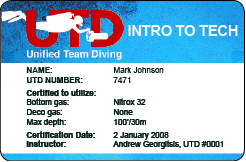
The Intro to Technical Diving course is designed to cultivate the fundamental techniques required by all sound technical, wreck, and cave diving practice. Intro to Tech functions as a technical entry point for all previously certified divers and as the prerequisite for all other technical UTD classes.
Intro to Tech focuses on the divers’ critical bottom skills. The training is centered around precise buoyancy control, team awareness, and controlled ascent procedures including surface marker buoy use.
The equipment required for Intro to Tech is centered on the UTD/DIR/hogarthian configuration, which includes a backplate and wing in lieu of a traditional BC, and a long hose for the primary regulator and short, necklaced hose for the backup. The class may be completed in either single or double tanks.
UTD’s Intro to Tech class continues the students’ path as a “Thinking Diver” and brings an increased awareness of the underwater environment. While preparing the diver for more advanced, technical dive training, the Intro to Tech student will also develop excellent diving skills for use in recreational diving situations.
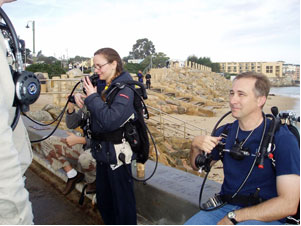
Prerequisites
- Minimum 18 years of age
- UTD Rec 2 or equivalent
- Minimum of 50 dives beyond open water certification. 25 of which must be non-training dives
Course limits
- Maximum depth is 60’/18m
- Standard gas is Nitrox 32
- No stage decompression
Who this class is designed for?
Many divers find all the adventure they need in recreational dives to 100' or less. But some feel that maybe they are missing some skills that technical divers have such as "horizontal decompression stops". Or maybe you linger at the top of the wall, looking down into the inky abyss? Does the idea of penetrating a wreck, with only your lights and a guideline to lead you give you good goose bumps? Do you think you'll never be happy unless you're flying past a pinnacle at 200' on a scooter? Technical diving is about having fun, just like any other pastime. But, like anything worth doing, it requires perseverance and hard work. This class is designed for the diver eager to learn some basic technical diving skills which can help improve their recreational diving ability or want to begin building a strong foundation to start pursuing the challenge of technical diving.
Why Take this Class?
Maybe you want to learn something new (like the UTD configuration) or you want to improve your safety by learning to do horizontal air sharing drills. Regardless of your motivation, in this class you will be introduced to the technical diver's toolbox. You will learn to hover motionless, move forward and backward, turn around without disturbing the bottom. You will learn to air share gas with yOur Teammate in a reasonable and efficient manner. You will learn to ascend, making appropriate stops while deploying a surface marker to alert the boat and support team of our predicament to basic use of a deco bottle. In the classroom, technical divers need to know which gas to choose and why, how to plan a dive (including Decompression techniques), from the back of the truck to a bench on the boat, and how to ensure that everyone has a great time and gets home safely. Intro to Tech isn't about showcasing the latest equipment, or rushing you into the next class. It's about working to develop skills that will improve your dive, and thus propel into a world of exploration. If this sounds a bit more than you had envisioned, or you are unsure about your preparation, please feel free to contact us, or see our Essentials class.
Class Information
The Intro to Tech class is designed to be taught over a three (3) full day period, with 8 hours of class and 4 open water dives.
Day 1. Typically the class begins with a 3 - 4 hour initial session consisting of introductions, a power point presentation including video tape of the skills to be evaluated throughout the class. Following a break for lunch and then a 3-4 hour of hands-on equipment fitting, review of gear configuration and a discussion of the pro’s and con’s of various equipment choices. Once the gear in properly fitted and configured the class then focuses on the “dry runs” of the skills and some practice before entering the water. Dry runs allow the student to practice the skills on land, before entering the water, under the watchful eye of the instructor(s). Skills include evaluation of divers trim, proficiency and precision buoyancy control, perfecting propulsion techniques (including learning how to kick backwards), fine-tuning equipment configurations, refining underwater communication, utilizing a team diving approach, and effective dive planning
Day 2. Begins with students conducting 2 (two) dives, putting the skills and concepts discussed the previous day into practical use while the instructor demonstrates and the videographer captures the in-water session for review and evaluation after lunch. We conclude the day with a 1-2 hour video review where the performance is analyzed, with long discussions on how to improve. Finally, 2-3 hours of lecture brings the day to a close.
Day 3. The third day is similar to the previous day wherein the student will commence with conducting the additional skills and improving on the prior days performance, during 2 (two) more dives which will again be video taped for subsequent review. The last dive of the class is an evaluation dive, where their performance will be analyzed and evaluated. After lunch the class will conclude with video review, final will lecture session and student performance review and final evaluations.
All UTD classes are videotaped for educational review, as we believe this is invaluable for students to visually focus on their individual in-water skills, situational awareness, communication, and team diving. Learning to self evaluate is an important aspect of any class, and video is one of the most important tools we have for instruction. You will be evaluated during the class to obtain the UTD "Intro to Tech" Certification. This Certification will allow you to continue within the UTD Technical or Overhead Training curriculum. Our focus is the complete dedication to your diving skills, knowledge & in water practice.
Requirements
- Minimum age of 18
- Completed UTD registration process
- UTD Recreational level 1 or equivalent (Advanced certifications)
- All UTD Classes are Non Smoking
- All participants must be able to swim at least 300 yards in 14 min or swim at least 600 yards in 18 minutes with mask & fins.
- All participants must be able to swim a distance of at least 50' (12m) on a breath hold or demonstrate an air share swim where the ooa diver swims at least 50' (15m) to the donating diver
- All participants must tow a diver in full equipment, in the environment they will be diving in at least 400 yards in 16 minutes
- All participants must demonstrate the rescue of a diver simulating oxygen toxicity.
- The use of prescription drugs must be authorized prior to the onset of diver training by a physician
Getting Started
- Check the Schedule of classes in your area
- Register Online
- Complete the online Knowledge Base course for Intro To Technical Diver
- Get a copy and review the "Intro To Technical Diving DVD"
Guidelines
- All dives are to maintain a working PO2 of no greater than 1.4
- Double tank configuration is required
- Average depth during class of 20ft (6m) - 30ft (9m).
- Deco or Stage bottle needed
- Air or Nitrox may be used for dives, depends on diver certification level.
- Instructor to student ratio maximum 6:1 in open water, adjusting downward for environmental conditions.
Equipment Specifications
UTD equipment configuration is designed to be simple, efficient, and consistent. To get the most from your class it is required that you take the course in a complete UTD style system. To better assist you in preparing for class, we have listed below the "required" equipment lists for the class.
Required Equipment:
UTD Technical Equipment Configuration:
- Backplate BC System SS or Aluminum Back plate w/ one piece web harness and hardware
- Back inflate style wing.
- At least one depth-measuring device
- At least one time-keeping device
- Fins: non-split variety
- At least one cutting device
- X-notes or Wetnotes
- One spool with 100 feet of line
- One surface marker or lift bag
- Exposure suit appropriate for the environment
- Cylinders Double tank configuration (1 per day of diving)
- A stage or decompression bottle is necessary for this class.
- Regulators & UTD Hose Configuration 5 or 7 ft. Primary Regulator Hose
- 22 or 24" Necklace Regulator Hose
- 24 or 26" SPG hose
Suggested Accessories (optional):
- BC mounted canister dive light w/ Goodman handle or long hose catch such as a knife pouch


